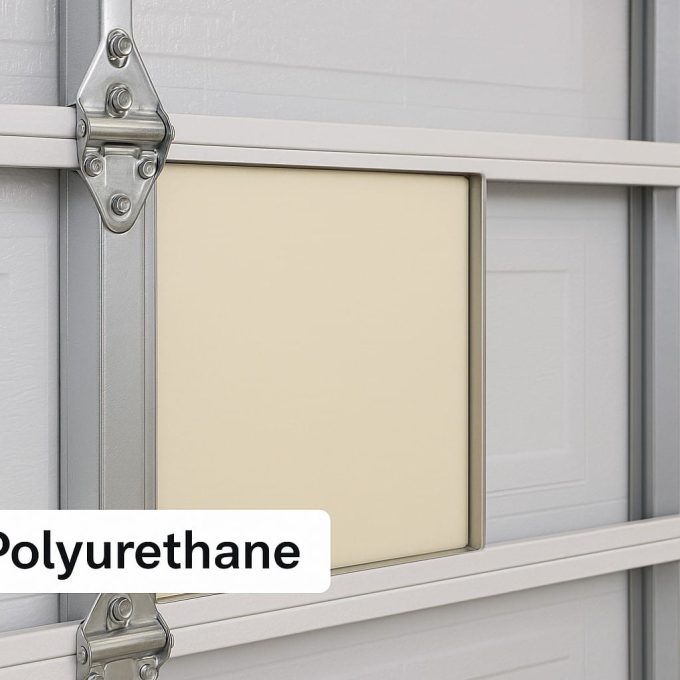Understanding Polyurethane vs. Polystyrene Insulated Garage Doors in Pennsylvania

During a recent service call in South Philadelphia, we met a homeowner whose garage felt more like a sauna in the summer and an icebox in the winter. The culprit? A worn-out, non-insulated steel garage door that allowed extreme outdoor temperatures to easily transfer into their garage space. After replacing it with a polyurethane-insulated garage door, the difference was immediate: improved temperature control, quieter operation, and lower monthly energy bills. This is one of many examples of how choosing the right insulated garage doors can transform your home’s comfort and efficiency.
A recent report from the U.S. Department of Energy shows that poorly insulated garage doors contribute significantly to heat loss in the winter and heat gain during the summer. In a state like Pennsylvania, with its four-season climate, this can lead to noticeable discomfort and high energy bills. Homeowners and businesses alike are turning to insulated doors for better energy efficiency, noise reduction, and long-term savings.
At Moruzzi Garage Door Center, we specialize in guiding our clients through the many options available, helping you understand not just what your choices are, but which type of garage door insulation works best for your climate, usage, and budget. In this comprehensive guide, we’ll break down everything you need to know about polyurethane and polystyrene insulated garage doors in simple terms.
What Are Insulated Garage Doors?
Insulated garage doors are engineered to reduce heat transfer between your garage and the outdoors. Traditional non-insulated doors, typically made of a single layer of steel or aluminum, offer minimal resistance to temperature fluctuations. In contrast, insulated garage doors include one or more layers of insulation material sandwiched between durable metal or fiberglass panels, acting as a thermal barrier that improves indoor comfort and reduces energy loss.
Benefits of Insulated Garage Doors:
- Enhanced Energy Efficiency: Reduced heat transfer means less work for your home’s HVAC system and lower energy bills.
- Comfortable Garage Space: Maintain a stable temperature in your garage for work, storage, or recreation—even in the height of summer or depths of winter.
- Noise Reduction: Insulated doors absorb sound better than thin steel or aluminum garage doors, making your home quieter.
- Increased Durability: The addition of rigid foam strengthens the door’s construction, making it more resistant to dents, warping, and daily wear.
- Improved Aesthetics and Value: Available in a wide range of door types, colors, and finishes from top brands like Clopay, Amarr, and Martin Garage Doors.
Why Garage Door Insulation Matters in Pennsylvania
In Pennsylvania, homeowners are all too familiar with icy winds in January and scorching heat waves in July. These weather extremes create significant stress on garage door systems, especially when the garage is attached to the home or used as a workshop, gym, or storage space.
Most homes in Philadelphia and nearby areas like Ardmore, Bensalem, and Cherry Hill use attached garages, which means poor insulation can affect nearby living areas. Cold drafts and heat seepage from an uninsulated garage door increase your heating and cooling costs and decrease overall comfort. Choosing the right insulated garage door is a critical investment in your home’s energy efficiency and indoor climate.
Polyurethane Insulated Garage Doors
What Is Polyurethane Insulation?
Polyurethane is a dense, expanding foam made from urethane compounds. It’s injected between the inner and outer panels of a garage door, where it expands to fill every gap and adheres firmly to the door’s surface. This creates a tight, seamless layer of insulation that offers superior performance.

Pros of Polyurethane Garage Doors:
- High R-Value: Offers industry-leading R-values from 12 to 20+, providing excellent heat insulation.
- Compact Yet Strong: Even thinner doors provide greater thermal resistance, which is perfect for limited garage space.
- Superior Noise Reduction: Polyurethane’s dense foam structure minimizes vibration and dampens exterior noise.
- Improved Door Strength: The foam binds directly to the door panels, enhancing structural integrity and reducing warping.
- Ideal for Pennsylvania Weather: Handles the state’s fluctuating temperatures and seasonal weather conditions with ease.
Polyurethane Garage Door Applications:
- Residential homes with attached garages.
- Commercial garages require durable, energy-efficient barriers.
- Upgrades for Chamberlain garage doors, Craftsman garage doors, or premium sectional doors.
Polystyrene Insulated Garage Doors
What Is Polystyrene Insulation?
Polystyrene is a rigid foam board, often made from expanded or extruded polystyrene. In garage doors, it is inserted between steel or aluminum layers but does not chemically bond to the panels like polyurethane does.

Pros of Polystyrene Garage Doors:
- Cost-Effective: Great for budget-conscious homeowners seeking an upgrade from non-insulated doors.
- Decent Insulation: Offers R-values in the range of 6 to 10, sufficient for detached garages or mild climates.
- Easy to Install: Lightweight panels and simple construction make installation quicker and less labor-intensive.
- Upgradable Options: You can find polystyrene garage door insulation kits and inserts for basic improvement.
Best Use Cases:
- Detached garages are not directly connected to living spaces.
- Seasonal properties with lower energy usage.
- Homeowners are looking for a mid-range garage door insulation option.
Side-by-Side Comparison: Polyurethane vs. Polystyrene
Feature | Polyurethane | Polystyrene |
Insulation Type | Expanding, bonded urethane foam | Solid styrofoam panel |
R-Value Range | 12 – 20+ | 6 – 10 |
Thermal Efficiency | Excellent heat insulation, high U-value | Good for mild weather, moderate U-value |
Noise Reduction | Superior noise control | Decent sound buffering |
Durability | High, resistant to dents and warping | Medium, may separate or compress |
Initial Cost | Higher upfront investment | More affordable initial cost |
Installation Method | Factory-injected and bonded | Inserted between door panels |
Garage Door Options | Ideal for attached garages, high-usage | Suited for detached garages, low-traffic |
Energy Savings and Return on Investment
Investing in an insulated garage door is more than just about comfort, it’s about smart economics. Improved thermal transfer resistance means your heating and cooling systems don’t have to work as hard. This leads to measurable energy savings, often cutting energy bills by 10–20%, depending on your usage and insulation type.
A properly insulated garage can also improve your home’s resale value. Buyers increasingly value energy-efficient upgrades, especially in competitive markets like Philadelphia, King of Prussia, and Northeast PA.
Maintenance, Durability, and Materials
Both polyurethane and polystyrene insulated doors require minimal upkeep. However, polyurethane foam adds significant rigidity to the garage door, making it more resistant to impacts from vehicles, sports equipment, or weather-related wear and tear.
When combined with steel, fiberglass, or aluminum skins, these doors stand up well to corrosion, UV exposure, and fluctuating temperatures. Regular inspections of hinges, tracks, seals, and the garage door opener’s logic board will ensure smooth operation year-round.
Brands, Kits, and Door Types
We proudly install and service premium garage door brands, including:
- Clopay Garage Doors
- Amarr Garage Doors
- Martin Garage Doors
Whether you need a single door, double-wide, or custom sectional doors, we offer matching garage door insulation kits, styles, and finishes to suit your home’s exterior. We also install and repair compatible garage door openers, including smart models that work with smartphone apps and light sensors for safety.
How Can Moruzzi Garage Door Center Help You?
At Moruzzi Garage Door Center, we’re more than just an installation team, we’re your neighborhood experts in garage door insulation. From polyurethane-filled models offering elite R-values to polystyrene options suited for detached spaces, we help homeowners across Philadelphia choose the right solution for their needs.
📍 Visit Us: 1300 Market St, Philadelphia, PA 19107
📞 Call Now: (267) 732-0907 to schedule your FREE estimate or request a consultation.
Let us help you improve your garage’s energy performance, lower your energy bills, and create a more comfortable, quiet, and durable garage environment. Experience long-lasting value with professional service and premium insulated garage doors.
Frequently Asked Questions (FAQs)
Q1: Can I add insulation to my existing garage door instead of replacing it?
Yes, many homeowners use garage door insulation kits like batt insulation or rigid foam panels, but they may not match the efficiency of factory-insulated models.
Q2: What is a good R-value for insulated garage doors in Pennsylvania?
For Pennsylvania’s climate, we recommend R-values of at least 12–14 for attached garages and 6–10 for detached garages.
Q3: Will insulation affect how my garage door opener works?
Only slightly. Insulated garage doors may weigh more, so ensuring your garage door opener has sufficient power is important—most modern openers can handle the load.
Q4: Is fiberglass a good insulation option for garage doors?
Fiberglass is rarely used in modern insulated garage doors. Polyurethane and polystyrene offer better performance and easier integration into door panels.
